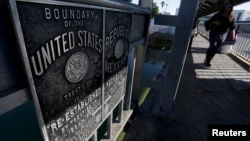Tens of thousands of Cubans living in the U.S. are adapting to a harsh new reality: After enjoying decades of favored status dating back to the Cold War, many of them now face the same deportation risks as any other immigrants.
They feel betrayed by former President Barack Obama’s administration, which in its waning days stripped away a nearly automatic path to citizenship that had been offered since the 1960s to Cubans who arrived on U.S. soil, even those who showed up without a visa. The change was part of a thaw in relations with Cuba, which also agreed to start accepting the return of more of its people who are deported.
Cuba policy announcement
Now some Cubans have been detained at routine appointments with immigration officials, and many more fear they could be imperiled by old deportation orders or caught up in the increased arrests of non-citizens pursued by President Donald Trump’s administration.
“I wasn’t prepared for any of this. How could I have seen this coming?” said Maykel Vargas, a Cuban who spent three months in detention after immigration officials took him into custody when he was trying to renew a temporary document. “I don’t know what is going to happen.”
Anticipation is mounting about a White House announcement on Cuba planned for Friday and how it may affect business deals and leisure travel. But experts agree that Trump’s new policy is not expected to restore previous immigration privileges. Any changes open the possibility that the Cuban government could scale back commitments on migration agreements, including promises to take back deportees.
Vargas, 37, worked as an Uber and Lyft driver to provide for his sister, who is single and pregnant. He said he couldn’t afford the $700 required to apply for permanent residency, a much more complex process. He continues fighting deportation after being released Monday with an ankle monitor.
Immigration officials did not respond to requests for information.
More than 36,000 affected
Officials say more than 36,000 Cubans currently face deportation orders. About 29,000 are convicted criminals and 7,000 non-criminal immigration violators, according to Immigration and Customs Enforcement.
Two other Cubans who were taken into custody last month after being here for decades are getting the attention of elected officials. They arrived as children in the famous Mariel boatlift in 1980, when Cuba’s then-President Fidel Castro allowed the departure of anyone who wanted to leave the Communist nation. About 125,000 “marielitos” crossed the Florida Straits that year.
Apart from the Mariel list, Cuba has agreed to review deportations on a case-by-case basis. Fifty-seven Cubans have been deported since October, while 335 were arrested between Jan. 22 and April 29.




